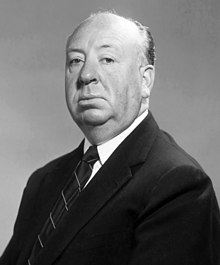
Back Alfred Hitchcock Afrikaans Alfred Hitchcock ALS አልፍሬድ ሂችኮክ Amharic Alfred Hitchcock AN ألفريد هتشكوك Arabic الفريد هيتشكوك ARZ আলফ্ৰেড হিচকক Assamese Alfred Hitchcock AST Alfred Hitchcock Aymara Alfred Hiçkok Azerbaijani
Alfred Hitchcock | |
|---|---|
 Hitchcock, c. 1960s | |
| Born | Alfred Joseph Hitchcock 13 August 1899 Leytonstone, Essex, England |
| Died | 29 April 1980 (aged 80) Los Angeles, California, US |
| Citizenship |
|
| Occupations |
|
| Years active | 1919–1980 |
| Works | Full list |
| Spouse | |
| Children | Pat Hitchcock |
| Awards | Full list |
| Signature | |
 | |
Sir Alfred Joseph Hitchcock (13 August 1899 – 29 April 1980) was an English film director. He is widely regarded as one of the most influential figures in the history of cinema.[1] In a career spanning six decades, he directed over 50 feature films,[a] many of which are still widely watched and studied today. Known as the "Master of Suspense", Hitchcock became as well known as any of his actors thanks to his many interviews, his cameo appearances in most of his films, and his hosting and producing the television anthology Alfred Hitchcock Presents (1955–65). His films garnered 46 Academy Award nominations, including six wins, although he never won the award for Best Director, despite five nominations.
Hitchcock initially trained as a technical clerk and copywriter before entering the film industry in 1919 as a title card designer. His directorial debut was the British–German silent film The Pleasure Garden (1925). His first successful film, The Lodger: A Story of the London Fog (1927), helped to shape the thriller genre, and Blackmail (1929) was the first British "talkie".[4] His thrillers The 39 Steps (1935) and The Lady Vanishes (1938) are ranked among the greatest British films of the 20th century. By 1939, he had international recognition and producer David O. Selznick persuaded him to move to Hollywood. A string of successful films followed, including Rebecca (1940), Foreign Correspondent (1940), Suspicion (1941), Shadow of a Doubt (1943) and Notorious (1946). Rebecca won the Academy Award for Best Picture, with Hitchcock nominated as Best Director.[5] He also received Oscar nominations for Lifeboat (1944), Spellbound (1945), Rear Window (1954) and Psycho (1960).[6]
Hitchcock's other notable films include Rope (1948), Strangers on a Train (1951), Dial M for Murder (1954), To Catch a Thief (1955), The Trouble with Harry (1955), Vertigo (1958), North by Northwest (1959), The Birds (1963) and Marnie (1964), all of which were also financially successful and are highly regarded by film historians. Hitchcock made a number of films with some of the biggest stars in Hollywood, including four with Cary Grant, four with James Stewart, three with Ingrid Bergman and three consecutively with Grace Kelly. Hitchcock became an American citizen in 1955.
In 2012, Hitchcock's psychological thriller Vertigo, starring Stewart, displaced Orson Welles' Citizen Kane (1941) as the British Film Institute's greatest film ever made based on its world-wide poll of hundreds of film critics.[7] As of 2021[update], nine of his films had been selected for preservation in the United States National Film Registry,[b] including his personal favourite, Shadow of a Doubt (1943).[c] He received the BAFTA Fellowship in 1971, the AFI Life Achievement Award in 1979, and was knighted in December of that year, four months before his death on 29 April 1980.[10]
- ^ Cite error: The named reference
influentialwas invoked but never defined (see the help page). - ^ Adair 2002, p. 9.
- ^ Ebert, Roger (1 May 1980). "The Master of Suspense is Dead". Chicago Sun-Times. Archived from the original on 26 December 2017. Retrieved 26 December 2017.
- ^ Cite error: The named reference
Blackmailwas invoked but never defined (see the help page). - ^ Cite error: The named reference
Rebeccawas invoked but never defined (see the help page). - ^ "AFI's 100 Greatest American Films of All Time". American Film Institute. Archived from the original on 19 May 2019. Retrieved 8 September 2018.
- ^ Cite error: The named reference
Christie2012was invoked but never defined (see the help page). - ^ "Complete National Film Registry Listing". Library of Congress. Archived from the original on 31 October 2016. Retrieved 21 December 2018.
"Brief Descriptions and Expanded Essays of National Film Registry Titles" Archived 1 January 2018 at the Wayback Machine. Library of Congress. Retrieved 21 December 2018.
- ^ Morehouse, Rebecca (16 July 1972). "Alfred Hitchcock Not a Male Chauvinist". Lima News. North American Newspaper Alliance.
- ^ Cite error: The named reference
Todd30April1980was invoked but never defined (see the help page).
Cite error: There are <ref group=lower-alpha> tags or {{efn}} templates on this page, but the references will not show without a {{reflist|group=lower-alpha}} template or {{notelist}} template (see the help page).